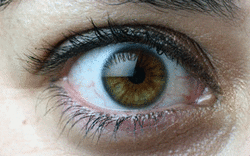 In order to maintain normal vision your nervous system has developed an extraordinary ability to keep viewed objects of interest focused on the central region of your retina, called the fovea, both at rest and with motion. If your eyes are involuntarily moving to and fro at too great a speed (a symptom called nystagmus) while you are attempting to focus on an object, your vision will be degraded. Often this blurring of vision is accompanied by the illusion that the environment around you is moving. We call this sensation oscillopsia and it is often accompanied by a loss of equilibrium. These problems are quite common in MS patients and often left untreated. The more severe forms of nystagmus in people with MS (called acquired pendular nystagmus) are easy for an observer to recognize since one or, more often, both eyes are constantly moving in a pendular or elliptical pattern. Subtle forms of acquired nystagmus or difficulty maintaining visual fixation with motion (caused by an impaired vestibule-ocular reflex) are more difficult for an observer to see, but can still significantly degrade vision and cause oscillopsia with motion (walking or driving or turning the head) or certain positions of the eyes (looking to one side or the other). The goal of management is to reduce visual blurring or oscillopsia by slowing down the speed of the nystagmus or compensating for the abnormal eye movements. Those individuals with an impaired vestibulo-ocular reflex without spontaneous nystagmus (vision degraded only with head motion or movement) must maintain head and object (words) stability during tasks such as reading. General management of all forms of nystagmus begin with use of stabilized large print for viewing. Patients with markedly asymmetric nystagmus may benefit from patching the eye with the greater movement. A number of medications are partially effective in slowing down the speed of nystagmus and improving vision. All of these medications are worth trying if your nystagmus is significantly affecting your vision.
Other forms of nystagmus in people with MS are less often associated with persistent degradation of vision or oscillopsia; but if treatment is required, I would recommend the same trial of medications. For intractable nystagmus that does not respond to drug treatment there are several treatment options, but few of these options are tolerable or readily available in most communities. Optical devices (thick contact lens) that negate the visual effects of nystagmus (high-plus spectacle lenses in combination with high-minus contact lens) were pioneered by my former colleague in Cleveland, Dr. John Leigh, but were never well tolerated by most patients. Several years ago I heard that electro-optical devices were being developed to measure and record the abnormal eye movements constantly and use real time image shifting technology to maintain object fixation. I am not sure where this technology stands at present, but it would certainly be an interesting technology to incorporate in the future development of “Smart Eye Wear” devices. Some investigators have used botulinum toxin injected into the extraocular muscles (those that move the eyes) to treat refractory nystagmus, but this effects normal movement of the eyes (causing double vision) and lasts only for a few months. -Rip Kinkel, MD
1 Comment
Ila
9/18/2014 11:17:10 pm
I have had this trouble off and on since my dx in 2002, it's interesting to understand what is going on. It can become a significant issue with fever, heat or over exertion.
Reply
Leave a Reply. |
DISCLAIMER:
The medical information and opinions on this site are provided as an information resource only, and are not to be used or relied on for any diagnostic or treatment purposes. The information and opinions expressed do not create any patient-physician relationship, and should not be used as a substitute for professional diagnosis and treatment. Please consult your health care provider before making any healthcare decisions or for guidance about a specific medical condition. Archives
January 2020
Categories
All
|
- Home
- About Us
- Virtual MS Center
- News & Resources
- Seminar Registration
- Health & Wellness
- Blogs
- About MS
-
Symptoms
- Balance and Walking Issues
- Breathing/Respiratory
- Bowel Dysfunction
- Cognitive Dysfunction
- Crying/Laughing Uncontrollably (PBA)
- Depression and Anxiety
- Dizziness/Vertigo
- Dysphagia
- Fatigue
- Foot Drop
- Hearing or Smell or Taste Changes
- Heat Sensitivity
- Leg Weakness
- Loss of Hand Dexterity and Coordination
- Memory and Mutliple Sclerosis
- Migraines
- Numbness/Tingling/Altered Sensation
- Nystagmus and Oscillopsia
- Pain
- Sexual Dysfunction
- Sleep Issues
- Spasticity/Spasms/Cramps
- Speech/Swallowing
- Urination/Bowel Problems
- Vision
- MS Clinics
- MS Topics
- Register With Us
- Terms of Use/Privacy/HIPAA
- MS HealthCare Journey

 RSS Feed
RSS Feed
